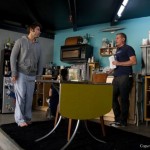 Sitting down to talk with writer-director-executive producer (and one-time British boy-band singing sensation), David W. Ross, you get the sense that queer cinema has long since moved passed its awkward, self-conscious adolescent stage and morphed quite naturally into adulthood. I Do, the latest project from David, addresses one of the many by-products of DOMA, the Defense of Marriage Authorization act signed into law by then-President Bill Clinton in September, 1996. Among its many discriminatory policies, it bars men and women living outside the United States from obtaining their citizenship simply by marrying the person they love here in the United States. And while it is far from easy for heterosexual couples to execute this process, it is downright impossible for members of the LGBT community. Since marriage is being granted on the state level (however slowly), and because states do not have jurisprudence over the issue, gay couples who want to get married to their loved ones from overseas are, well, shagged.
Sitting down to talk with writer-director-executive producer (and one-time British boy-band singing sensation), David W. Ross, you get the sense that queer cinema has long since moved passed its awkward, self-conscious adolescent stage and morphed quite naturally into adulthood. I Do, the latest project from David, addresses one of the many by-products of DOMA, the Defense of Marriage Authorization act signed into law by then-President Bill Clinton in September, 1996. Among its many discriminatory policies, it bars men and women living outside the United States from obtaining their citizenship simply by marrying the person they love here in the United States. And while it is far from easy for heterosexual couples to execute this process, it is downright impossible for members of the LGBT community. Since marriage is being granted on the state level (however slowly), and because states do not have jurisprudence over the issue, gay couples who want to get married to their loved ones from overseas are, well, shagged.
Ross, however, has seen firsthand the deleterious effects of this policy during his many months of photographing couples during the whole Prop. 8 fiasco (you can see his work at unitedbylovedividedbylaw.com) and, bearing witness to these monstrous injustices spurred him on to make I Do.
 I Do is the story of one man’s struggle to stay connected to the family he loves – as much from love as from necessity – while fighting passionately for the family he was destined to have. San Diego LGBT Weekly had a chance to speak with David as he was going into the final week of fundraising for the picture where he addressed many of the issues that drive him and the picture.
I Do is the story of one man’s struggle to stay connected to the family he loves – as much from love as from necessity – while fighting passionately for the family he was destined to have. San Diego LGBT Weekly had a chance to speak with David as he was going into the final week of fundraising for the picture where he addressed many of the issues that drive him and the picture.
San Diego LGBT Weekly: Let’s start with where you are in the production of I Do. Do you have a first draft of the film completed?
David W. Ross: Right now we’re getting ready to lock picture. Which means you can’t change anything once that’s done to the edit. Next is sound design, color correction etc. Making it look and feel like a real movie [which is] slightly nerve wracking. LOL! But we have some great people working with us
I’m sure. You probably have a lot riding on this in terms of your commitment to what I Do speaks to. How long did it take you to film the movie?
We were in pre-production for about two to three months and then we filmed for about eight weeks in total. There were a few days we shot in the New Year, too.
And since funding was not certain, maybe you can talk a little bit about what is becoming an increasingly popular – and necessary tool – to get queer cinema out to the large public: crowdsourcing. Or is there another word you prefer?
Crowdsourcing is good. Angels from the indie film heavens is also another way you could put it! Funding was always certain in my head. There was no question I was going to make this film. I just had to figure out how to get there. I got an email from a friend who passed on a link to one of their friend’s Kickstarter campaigns and I was blown away. I had never seen anything like it. A couple of months later I was on there. It’s amazing for indie film makers. We’re on indiegogo now and almost done!
How much did you raise in total? And were you surprised that you raised that amount?
We raised just over $53,000 which is epic. I didn’t know it was an epic amount when I started out. With Kickstarter if you don’t make the full amount by deadline you don’t get a penny! So I was sweating it when we were only half funded with five days to go! I hit target during the shoot for the photo project I’m doing with Judy Rickard called United By Love Divided By Law. We’re documenting bi-national same-sex couples. I thought that was very fitting. A very moving day indeed!
 Without overstating the obvious, what are some of the themes you encountered with these couples? For example, did you notice a lot of mixed-race couples?
Without overstating the obvious, what are some of the themes you encountered with these couples? For example, did you notice a lot of mixed-race couples?
All sorts. Europe, Asia, South America. I think people forget just how DOMA is affecting people. It’s not only people in the States it’s also thousands of American’s who have to make the hard decision to live in other countries because they can’t sponsor their spouse a green card.
Ang Lee’s 1993 picture The Wedding Banquet addresses ideas that run on a parallel track to the main thrust of I Do. Can you talk a bit about how the political landscape has changed in the last 20 years; not only in how the LGBT community tells its stories but how we live our lives?
Ang Lee’s film, I think, was more about conforming to the very specific family and cultural pressure to marry. I Do really is a love story but I’ve also looked at how society molds us, especially girls, from a young age, to want to get married. How straight people feel a pressure to conform, have kids etc and how being gay, you kind of still live in all that societal and media pressure to “get the girl,” “buy the ring,” “wear a puffy white dress,” etc but we skirt on the outside. I read The Velvet Rage and it blew my mind.
One of things that appeals to me about I Do – among many, actually is that, like Judas Kiss, you are telling a new kind of gay-themed story. I mean, if I see one more coming out story, I’ll vote Republican. What has changed?
That’s funny. Well … Don Roos said something a few Outfests ago that really stuck with me. He said it’s not enough for gay film makers to rely on the same old material or story lines. I think we need to tell bigger stories where the characters are not defined primarily by their sexuality or that experience. Of course there’s room for everything, but I’m more interested in making films. Telling stories. If the character is gay, that should be No. 8 on his list of how he identifies. That’s just my opinion. And those are the films I personally want to see. I want to see a story about humans going through something. Period.
I really wish we had more time to talk, David. There’s still a lot of ground to cover – cinematically and metaphorically. But I will say this: You were, by far, the sexiest member of Boy Bands, Inc.
Well thank you! I’m a lot older, have a few more grey hairs now.
I Do will be showing at the 30th annual Outfest in Los Angeles, July 12 – 22. For more details, visit Outfest.org.











